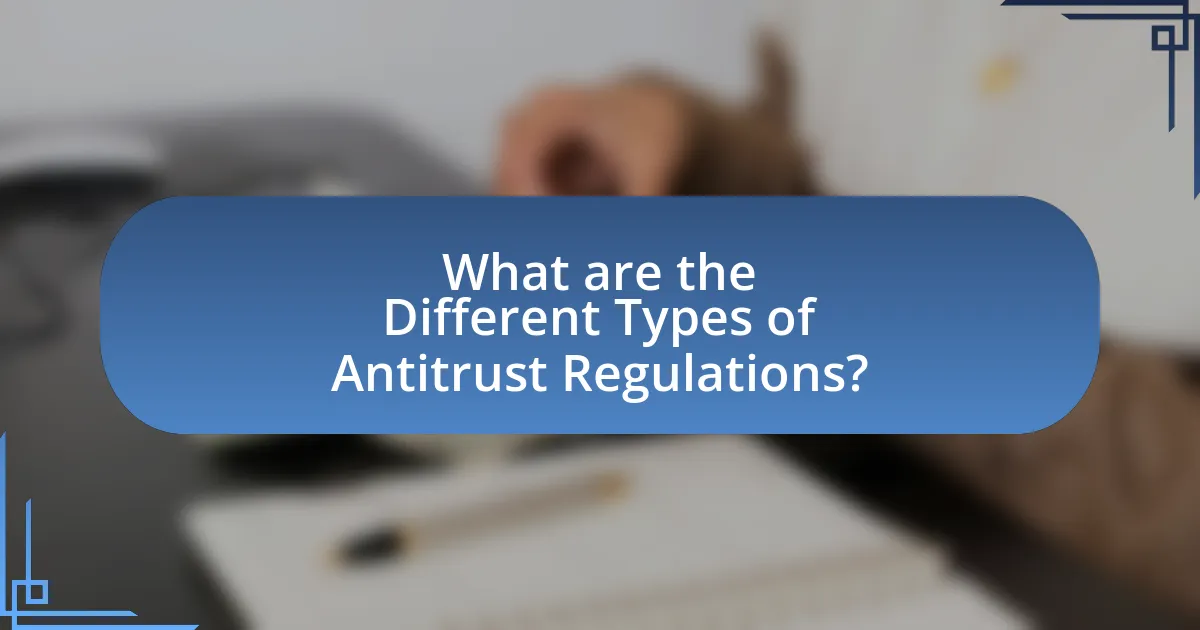Antitrust laws are crucial regulations aimed at promoting competition and preventing monopolistic practices in corporate mergers. This article explores the purpose and impact of these laws, including key principles such as the prohibition of anti-competitive agreements and the regulation of mergers that may lessen competition. It discusses the roles of federal and state agencies, particularly the Federal Trade Commission and the Department of Justice, in enforcing these laws and the potential consequences for companies that violate them. Additionally, the article outlines best practices for navigating antitrust regulations during mergers, emphasizing the importance of thorough market analysis, legal counsel, and transparent communication with regulatory bodies to ensure compliance and successful merger outcomes.

What are Antitrust Laws and Their Purpose in Corporate Mergers?
Antitrust laws are regulations designed to promote competition and prevent monopolistic practices in the marketplace. Their primary purpose in corporate mergers is to ensure that such consolidations do not significantly reduce competition, which could lead to higher prices, lower quality of goods and services, or stifled innovation. For instance, the Sherman Act of 1890 and the Clayton Act of 1914 are foundational U.S. antitrust laws that prohibit anti-competitive agreements and mergers that may substantially lessen competition or create a monopoly. These laws empower regulatory bodies, such as the Federal Trade Commission and the Department of Justice, to review proposed mergers and block those deemed harmful to market competition.
How do Antitrust Laws impact corporate mergers?
Antitrust laws significantly impact corporate mergers by regulating and potentially blocking transactions that may reduce competition in the marketplace. These laws, such as the Sherman Act and the Clayton Act in the United States, aim to prevent monopolistic practices and promote fair competition. For instance, the Federal Trade Commission (FTC) and the Department of Justice (DOJ) review proposed mergers to assess their effects on market competition. In 2020, the DOJ blocked the merger between Sabre and Farelogix, citing concerns that it would harm competition in the travel technology market. This demonstrates how antitrust laws serve as a critical mechanism to ensure that mergers do not create unfair market dominance or harm consumers.
What are the key principles behind Antitrust Laws?
Antitrust laws are designed to promote competition and prevent monopolistic practices. The key principles behind these laws include the prohibition of anti-competitive agreements, the prevention of monopolization, and the regulation of mergers and acquisitions that may substantially lessen competition. For instance, the Sherman Act of 1890 prohibits contracts, combinations, or conspiracies that restrain trade, while the Clayton Act of 1914 addresses specific practices like price discrimination and exclusive dealings. These laws aim to protect consumer welfare and ensure a fair marketplace by preventing firms from engaging in practices that could harm competition or lead to market dominance.
Why are Antitrust Laws essential for market competition?
Antitrust laws are essential for market competition because they prevent monopolistic practices and promote a fair marketplace. These laws ensure that no single entity can dominate a market, which fosters innovation, lowers prices, and enhances consumer choice. For instance, the Sherman Act of 1890 and the Clayton Act of 1914 in the United States were established to combat anti-competitive behaviors, such as price-fixing and market allocation, which can stifle competition. By enforcing these regulations, authorities can maintain a level playing field, encouraging businesses to compete based on quality and price rather than through unfair practices.
What are the potential consequences of violating Antitrust Laws?
Violating antitrust laws can lead to severe legal and financial consequences for corporations. These consequences include substantial fines, which can reach billions of dollars, as seen in cases like the $5 billion fine imposed on Google in 2018 for antitrust violations. Additionally, companies may face injunctions that prevent them from continuing certain business practices, and they could be required to divest assets or restructure operations to restore competition. Furthermore, executives may face criminal charges, leading to imprisonment, as evidenced by the 2019 case where former executives of a major company were sentenced to prison for colluding to fix prices. These repercussions underscore the importance of compliance with antitrust regulations in corporate mergers.
How can companies face penalties for non-compliance?
Companies can face penalties for non-compliance with antitrust laws through fines, legal sanctions, and operational restrictions. For instance, the Federal Trade Commission (FTC) and the Department of Justice (DOJ) can impose substantial monetary fines, which can reach millions of dollars, depending on the severity of the violation. Additionally, companies may be subject to injunctions that prevent them from proceeding with mergers or acquisitions deemed anti-competitive. Historical cases, such as the 2018 AT&T-Time Warner merger, illustrate that non-compliance can lead to prolonged legal battles and significant financial repercussions, reinforcing the importance of adhering to antitrust regulations.
What are the long-term effects on a company’s reputation?
The long-term effects on a company’s reputation include diminished consumer trust, reduced market share, and potential legal repercussions. When a company navigates antitrust laws poorly during mergers, it can lead to negative public perception, as consumers may view the company as monopolistic or unethical. For instance, the merger between AT&T and Time Warner faced significant scrutiny, impacting public trust and leading to ongoing legal challenges. Additionally, companies with tarnished reputations often experience a decline in customer loyalty, which can result in a long-term decrease in sales and profitability. Research indicates that companies with strong reputations can achieve up to 20% higher sales growth compared to their less reputable counterparts, highlighting the critical importance of maintaining a positive image in the marketplace.

What are the Different Types of Antitrust Regulations?
Antitrust regulations primarily fall into three categories: prohibitions against monopolistic practices, regulations on mergers and acquisitions, and enforcement of fair competition laws. Prohibitions against monopolistic practices, such as those outlined in the Sherman Act of 1890, prevent companies from engaging in anti-competitive behavior that stifles competition. Regulations on mergers and acquisitions, governed by the Clayton Act of 1914, assess the potential impact of corporate consolidations on market competition. Enforcement of fair competition laws, including the Federal Trade Commission Act, aims to protect consumers and ensure a level playing field for businesses. These regulations collectively work to maintain market integrity and prevent anti-competitive practices.
How do Horizontal and Vertical Mergers differ under Antitrust Laws?
Horizontal mergers occur between companies that operate in the same industry and are direct competitors, while vertical mergers involve companies at different stages of the supply chain. Under antitrust laws, horizontal mergers are scrutinized for their potential to reduce competition and create monopolies, as they can lead to higher prices and reduced choices for consumers. For example, the Federal Trade Commission (FTC) blocked the merger between Staples and Office Depot in 2016, citing concerns over reduced competition in office supply retail. In contrast, vertical mergers are evaluated based on their potential to create efficiencies or control supply chains, but they can also raise concerns about market power and anti-competitive practices, as seen in the merger of AT&T and Time Warner, which was challenged on the grounds of potential harm to competition in the media landscape. Thus, the primary difference lies in the competitive dynamics and market implications each type of merger presents under antitrust scrutiny.
What defines a Horizontal Merger?
A horizontal merger is defined as a combination of two or more companies that operate in the same industry and are direct competitors. This type of merger typically aims to increase market share, reduce competition, and achieve economies of scale. For instance, when two automobile manufacturers merge, they consolidate their resources and customer bases, which can lead to enhanced efficiency and reduced costs. Historical examples include the merger of Daimler-Benz and Chrysler in 1998, which aimed to create a more competitive entity in the automotive market.
What defines a Vertical Merger?
A vertical merger is defined as a combination of two companies that operate at different stages of the production process within the same industry. This type of merger typically involves a supplier and a manufacturer or a manufacturer and a distributor, allowing for greater control over the supply chain and potentially reducing costs. For example, when a car manufacturer merges with a tire company, it exemplifies a vertical merger by integrating the supply of tires into the production process of vehicles. This integration can lead to increased efficiency and reduced dependency on external suppliers, which is a key characteristic of vertical mergers.
What role do Federal and State Agencies play in enforcing Antitrust Laws?
Federal and State Agencies play a crucial role in enforcing Antitrust Laws by investigating and prosecuting anti-competitive practices. The Federal Trade Commission (FTC) and the Department of Justice (DOJ) are the primary federal bodies responsible for enforcing these laws, which include reviewing mergers and acquisitions to prevent monopolistic behavior. For instance, in 2020, the DOJ filed a lawsuit to block the merger between Visa and Plaid, citing potential harm to competition. State Attorneys General also enforce antitrust laws at the state level, often collaborating with federal agencies to address anti-competitive conduct. This dual enforcement structure ensures a comprehensive approach to maintaining market competition and protecting consumer interests.
How does the Federal Trade Commission (FTC) influence corporate mergers?
The Federal Trade Commission (FTC) influences corporate mergers by reviewing proposed mergers to assess their potential impact on competition and consumer welfare. The FTC conducts investigations to determine if a merger would create or enhance market power or facilitate its exercise, which could lead to anticompetitive practices. For instance, the FTC has the authority to block mergers that it deems harmful, as seen in its actions against the proposed merger between Staples and Office Depot in 2016, where the FTC argued that the merger would significantly reduce competition in the office supply market. This regulatory oversight ensures that mergers do not violate antitrust laws, thereby maintaining a competitive marketplace.
What is the role of the Department of Justice (DOJ) in Antitrust enforcement?
The Department of Justice (DOJ) plays a critical role in antitrust enforcement by investigating and prosecuting violations of antitrust laws to promote competition and prevent monopolistic practices. The DOJ evaluates mergers and acquisitions to determine their potential impact on market competition, often challenging those that may substantially lessen competition or create a monopoly. For instance, the DOJ successfully blocked the merger between AT&T and Time Warner in 2018, arguing it would harm competition and lead to higher prices for consumers. This enforcement is guided by the Sherman Act and the Clayton Act, which provide the legal framework for preventing anti-competitive behavior.

How to Navigate Antitrust Laws During Corporate Mergers?
To navigate antitrust laws during corporate mergers, companies must conduct thorough pre-merger assessments to evaluate potential anti-competitive effects. This involves analyzing market share, competitive dynamics, and potential consumer harm. For instance, the Federal Trade Commission (FTC) and the Department of Justice (DOJ) assess mergers based on the Herfindahl-Hirschman Index (HHI), which measures market concentration; a significant increase in HHI post-merger may trigger scrutiny. Additionally, companies should engage legal counsel specializing in antitrust law to ensure compliance with regulations and to prepare for potential investigations or challenges from regulatory bodies.
What steps should companies take to ensure compliance with Antitrust Laws?
Companies should implement a comprehensive compliance program to ensure adherence to Antitrust Laws. This program should include conducting regular antitrust training for employees, establishing clear policies and procedures regarding competitive practices, and performing periodic audits to assess compliance. Additionally, companies must monitor market behavior and avoid practices such as price-fixing, bid-rigging, or market allocation, which are explicitly prohibited under these laws. Historical cases, such as the U.S. v. Microsoft Corp. in 2001, illustrate the consequences of non-compliance, emphasizing the importance of proactive measures in maintaining lawful competitive practices.
How can companies conduct effective pre-merger assessments?
Companies can conduct effective pre-merger assessments by systematically evaluating financial, operational, and cultural compatibility between merging entities. This involves performing thorough due diligence, which includes analyzing financial statements, assessing market positions, and understanding regulatory implications, particularly concerning antitrust laws. For instance, a study by the Federal Trade Commission highlights that comprehensive market analysis can reveal potential antitrust issues, ensuring that mergers do not create monopolistic scenarios. Additionally, engaging legal experts to interpret antitrust regulations can help identify risks and compliance requirements, thereby facilitating a smoother merger process.
What role does legal counsel play in navigating Antitrust regulations?
Legal counsel plays a critical role in navigating Antitrust regulations by providing expert guidance on compliance and risk management during corporate mergers. They analyze proposed transactions to identify potential antitrust issues, ensuring that companies adhere to relevant laws such as the Sherman Act and the Clayton Act. Legal counsel also prepares necessary documentation for regulatory filings and represents clients in discussions with antitrust authorities, thereby facilitating smoother merger processes. Their expertise is essential in assessing market impacts and advising on strategies to mitigate legal risks, which is crucial given that the Federal Trade Commission and the Department of Justice actively scrutinize mergers for anti-competitive effects.
What are common pitfalls to avoid when merging under Antitrust scrutiny?
Common pitfalls to avoid when merging under Antitrust scrutiny include inadequate pre-merger analysis, failure to address potential anti-competitive concerns, and insufficient communication with regulatory authorities. Inadequate pre-merger analysis can lead to overlooking market share implications, which may trigger antitrust investigations. Failure to address potential anti-competitive concerns, such as reduced competition or increased prices, can result in the merger being blocked or delayed. Insufficient communication with regulatory authorities can lead to misunderstandings and increased scrutiny, complicating the merger process. These pitfalls are critical to avoid, as they can significantly impact the success and legality of the merger.
How can companies misjudge market share implications?
Companies can misjudge market share implications by overestimating their competitive advantage and underestimating the potential for regulatory scrutiny. For instance, a company may assume that a significant increase in market share through a merger will lead to higher profits without considering that such a concentration could trigger antitrust investigations. Historical examples, such as the failed merger between AT&T and T-Mobile in 2011, illustrate this misjudgment; the merger was blocked due to concerns over reduced competition, despite AT&T’s belief that it would enhance their market position. This highlights the importance of accurately assessing both market dynamics and regulatory environments when evaluating the implications of market share changes.
What are the risks of inadequate market analysis?
Inadequate market analysis poses significant risks, including misinformed strategic decisions and potential legal repercussions. Companies may fail to identify competitive dynamics, leading to overvaluation of assets or underestimation of market challenges. For instance, a lack of understanding of market share can result in mergers that violate antitrust laws, as seen in the 2018 AT&T and Time Warner merger, where insufficient analysis of market competition raised regulatory concerns. Additionally, inadequate analysis can lead to missed opportunities for innovation and market positioning, ultimately harming long-term profitability and sustainability.
What best practices can companies adopt for successful merger navigation?
Companies can adopt several best practices for successful merger navigation, particularly in the context of navigating antitrust laws. First, conducting thorough due diligence is essential, as it helps identify potential regulatory hurdles and competitive concerns that may arise during the merger process. According to a study by the Federal Trade Commission, over 50% of mergers that faced antitrust scrutiny were due to inadequate assessment of market competition.
Second, engaging legal and economic experts early in the process ensures compliance with antitrust regulations and helps in formulating a robust merger strategy. Research from the Harvard Business Review indicates that companies that involve legal counsel from the outset are 30% more likely to achieve a smooth merger transition.
Third, maintaining transparent communication with stakeholders, including employees, customers, and regulators, fosters trust and mitigates resistance. A report by McKinsey & Company found that effective communication strategies can reduce employee turnover by up to 25% during mergers.
Lastly, developing a clear integration plan that addresses cultural alignment and operational synergies is crucial. The integration phase is often where mergers fail; studies show that 70% of mergers do not achieve their intended goals due to poor integration. By focusing on these best practices, companies can navigate the complexities of mergers more effectively while adhering to antitrust laws.
How can transparency with regulatory bodies enhance merger outcomes?
Transparency with regulatory bodies can enhance merger outcomes by fostering trust and facilitating smoother approval processes. When companies openly share relevant information with regulators, it reduces uncertainty and allows for a more efficient review of the merger. For instance, the Federal Trade Commission (FTC) and the Department of Justice (DOJ) often require detailed disclosures to assess potential antitrust concerns. A study by the American Bar Association found that mergers with proactive communication strategies experienced a 30% faster approval rate compared to those with limited transparency. This indicates that transparency not only expedites regulatory reviews but also minimizes the risk of legal challenges post-merger, ultimately leading to more favorable outcomes for the involved parties.
What strategies can be employed to address potential antitrust concerns?
To address potential antitrust concerns, companies can implement several strategies, including conducting thorough market analysis, engaging in proactive compliance programs, and seeking legal counsel. Conducting a market analysis helps identify competitive dynamics and potential monopolistic behaviors, allowing companies to adjust their strategies accordingly. Proactive compliance programs ensure that all business practices align with antitrust laws, reducing the risk of violations. Additionally, seeking legal counsel provides expert guidance on navigating complex regulations and can help in structuring mergers to minimize antitrust scrutiny. These strategies are supported by the fact that companies that actively engage in compliance and legal consultation are less likely to face antitrust litigation, as evidenced by cases where proactive measures led to successful merger approvals.


